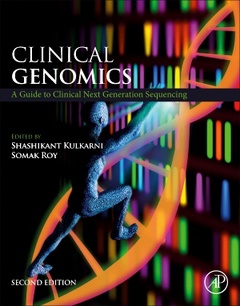Clinical Genomics (2nd Ed.) A Guide to Clinical Next Generation Sequencing
Coordonnateurs : Kulkarni Shashikant, Roy Somak

1. Overview of Technical Aspects and Chemistries of Next-Generation Sequencing
2. Clinical Genome Sequencing
3. Targeted Hybrid Capture Methods
4. Amplification-Based Methods
5. Emerging DNA Sequencing Technologies
6. RNA-Sequencing and Methylome Analysis
Section II: Bioinformatics
7. Base Calling, Read Mapping, and Coverage Analysis
8. Single Nucleotide Variant Detection Using Next Generation Sequencing
9. Insertions and Deletions (Indels)
10. Translocation Detection Using Next-Generation Sequencing
11. Structural Variant Detection
12. The Human Reference Genome
Section III: Clinical Informatics and IT Infrastructure
13. Data Storage
14. Data Analytics – Platforms and Technologies
15. Genomic Data Security and Privacy
16. Cloud Computing
17. Clinical NGS IT infrastructure implementation and validation
Section IV: Interpretation
18. Reference Databases for Disease Associations
19. Reporting of Clinical Genomics Test Results
20. Reporting Software
21. Constitutional Diseases: Amplification-Based Next-Generation Sequencing
22. Targeted Hybrid Capture for Inherited Disease Panels
23. Constitutional Disorders: Whole Exome and Whole Genome Sequencing
24. Somatic Diseases (Cancer): Amplification-Based Next-Generation Sequencing
25. Targeted Hybrid-Capture for Somatic Mutation Detection in the Clinic
26. Somatic Diseases (Cancer): Whole Exome and Whole Genome Sequencing
Section V: Regulation, Reimbursement, and Legal Issues
27. Assay Validation
28. Regulatory Considerations Related to Clinical Next Generation Sequencing
29. Genomic Reference Materials for Clinical Applications
30. Ethical Challenges to Next-Generation Sequencing
31. Legal Issues
32. Billing and Reimbursement Index
Dr. Somak Roy is an Assistant Professor, in the division of Molecular and Genomic Pathology, at the University of Pittsburgh Medical Center, in Pittsburgh, PA. He is also Director of Molecular Informatics and the Director of the MGP Fellowship Program, and Associate Laboratory Director of the Division of Molecular and Genomic Pathology. Dr. Roy's research is focused on understanding mechanisms of urothelial carcinogenesis and metastasis using next generation sequencing and microarray technologies. He also develops biomedical informatics solutions for optimizing clinical laboratory operations and quality management.
- Simplifies the complexities of NGS technologies for rapid education of clinical genomicists and genomic pathologists
- Instructs in tested practice-based analysis for precision diagnosis and treatment plans, as well as pipelines and meta-analysis for a full range of clinically important variants
- Provides technical consideration for the validation and implementation of bioinformatics pipelines and related resources in the clinical molecular laboratory
- Addresses novel sequencing technologies, including long-read sequencing for detecting structural variants and haplotypes
- Covers cloud computing and Modern IT infrastructure (data storage, security, analytics) for scalable and secure genomics medicine
Date de parution : 11-2024
Ouvrage de 562 p.
20.9x27.7 cm
Thème de Clinical Genomics :
Mots-clés :
Next-Generation Sequencing; Clinical genomics; genome sequencing; Clinical Genome Sequencing; Hybrid Capture Methods; Amplification-Based Methods; DNA Sequencing Technologies; RNA-Sequencing; Methylome Analysis; Single Nucleotide Variant Detection Using Next Generation Sequencing; Indels; Translocation Detection; Next-Generation Sequencing; Structural Variant Detection; Copy Number Variant Detection Using Next-Generation Sequencing; Human Reference Genome; Clinical Informatics and IT Infrastructure; Genome Data Storage; Genomic Data Security; Genomic Data Privacy; Cloud Computing and Genomics; Clinical NGS; Genomics Test Results; Somatic Mutation Detection; Whole Exome; Whole Genome Sequencing; Assay Validation; Billing and Genomic Medicine



